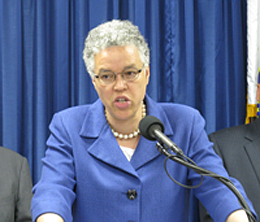Preckwinkle Proposes 1 Percent Sales Tax as County Pension Crisis Looms
Cook County, Ill., like the state of Illinois, is facing serious financial challenges.
Cook County Board President, Toni Preckwinkle, on Tuesday released the preliminary forecast for the County's Fiscal 2016 budget, announcing a projected operating shortfall of $198.75 million, driven by increasing labor costs, rising legacy debt service, increased costs of the Presidential election cycle, and reductions in court filing revenues.
"When we passed the last year's budget, I warned that fiscal year 2016 would be very challenging," Preckwinkle said. "As we begin to prepare our spending plan, we are now faced with making difficult but necessary decisions to ensure a stable financial future for Cook County and its citizens."
Preckwinkle said she will propose a 1 percent increase in the County sales tax, mainly aimed at addressing the County's pension crisis, along with the rise in legacy debt service and increased funding of road and bridge infrastructure.
The sales tax is projected to raise $308 million in 2016, which would leave a residual funding shortfall of $171.3 million when all factors are included.
Former Cook County Board President Todd Stroger in a June 23, Chicago Tribune interview, said he feels vindicated that Preckwinkle is trying to raise the sales tax -- the very issue that led to him losing re-election in 2010. Preckwinkle’s proposed sales tax increase comes five years after criticizing Stroger for doing the same thing. Stroger’s tax hike was highly unpopular and later repealed.
The Chicago Citizen Newspaper asked Tuesday morning, how is it that President Preckwinkle is considering a sales tax increase after running against and defeating Stroger, who also proposed an increase?
Preckwinkle’s spokesman, Frank Shuftan, provided the following statement:
“In 2010, when the additional 1% sales tax was last in place, the funds were used to balance the annual operating budget rather than fixing the fundamental structural issues that jeopardize the long-term solvency of the county. There was no plan in place to pay down pension liabilities or address rising debt service payments and half of motor fuel tax receipts were diverted to fund non-road costs. That was not fair to taxpayers and nor was it sustainable. The revenue increases that we are looking at, coupled with significant expenditure cuts, will put the County on firm financial footing for the future, allow us to invest in much-needed road infrastructure improvements, absorb increased legacy debt service costs, and pay down all pension liabilities without further exacerbating the financial crisis.”
In addition to the projected operating shortfall, Preckwinkle said that unfunded pension liabilities are pushing the County's Pension Fund toward a financial crisis, and when factoring in the annual actuarial deficit at the fund, and needed funding to repair and replace crumbling roads and bridges, the total projected shortfall rises to $479.3 million.
The Pension Fund shortfall now stands at approximately $6.5 billion; based on the market value of the fund's assets, the shortfall increases by $30 million a month as a result of continued inaction by Springfield on the County's proposed pension reform legislation, according to Preckwinkle.
"We worked for two years to design a pension reform package that is supported by a wide majority of our union partners and local business interests, and that we believe will survive a court test, but we have been unable to get Springfield to act on it," Preckwinkle said. "I appreciate that (Ill.) Gov. Bruce Rauner recently expressed his willingness to support our pension plan. But that isn't a guarantee. And while I am still willing to work with the Governor and the legislative leaders to secure our pension reform, I refuse to wait and kick the can down the road to bankruptcy. The more you kick the can, the heavier and bigger it gets, until one day it kicks back."
In the event that sustainable pension reform efforts are adopted and signed into law in Springfield, Preckwinkle said she will re-evaluate the County's revenue needs and make the appropriate changes to the sales tax levy.
Latest Stories
- Congressional Black Caucus Condemns Pritzker For Heavy-Handing In Senate Race
- Officiants, Speakers, and Performers are Announced for Reverend Jesse L. Jackson’s Peoples Celebration of Life and Homegoing Services
- Illinois EPA Announces $1.5 Million in Funding Available for Energy Efficiency Upgrades at Public Water Supply Facilities
- As We Prepare to Lay Rev. Jackson to Rest, I’m Thinking About Words That Build Coalitions
- SOUTH CHICAGO RESIDENTS LAUNCH “SOUTHEAST NEIGHBORS FOR QUANTUM” IN SUPPORT OF HISTORIC ILLINOIS QUANTUM AND MICROELECTRONICS PARK DEVELOPMENT
Latest Podcast
MEDICAL POWER OF ATTORNEY



